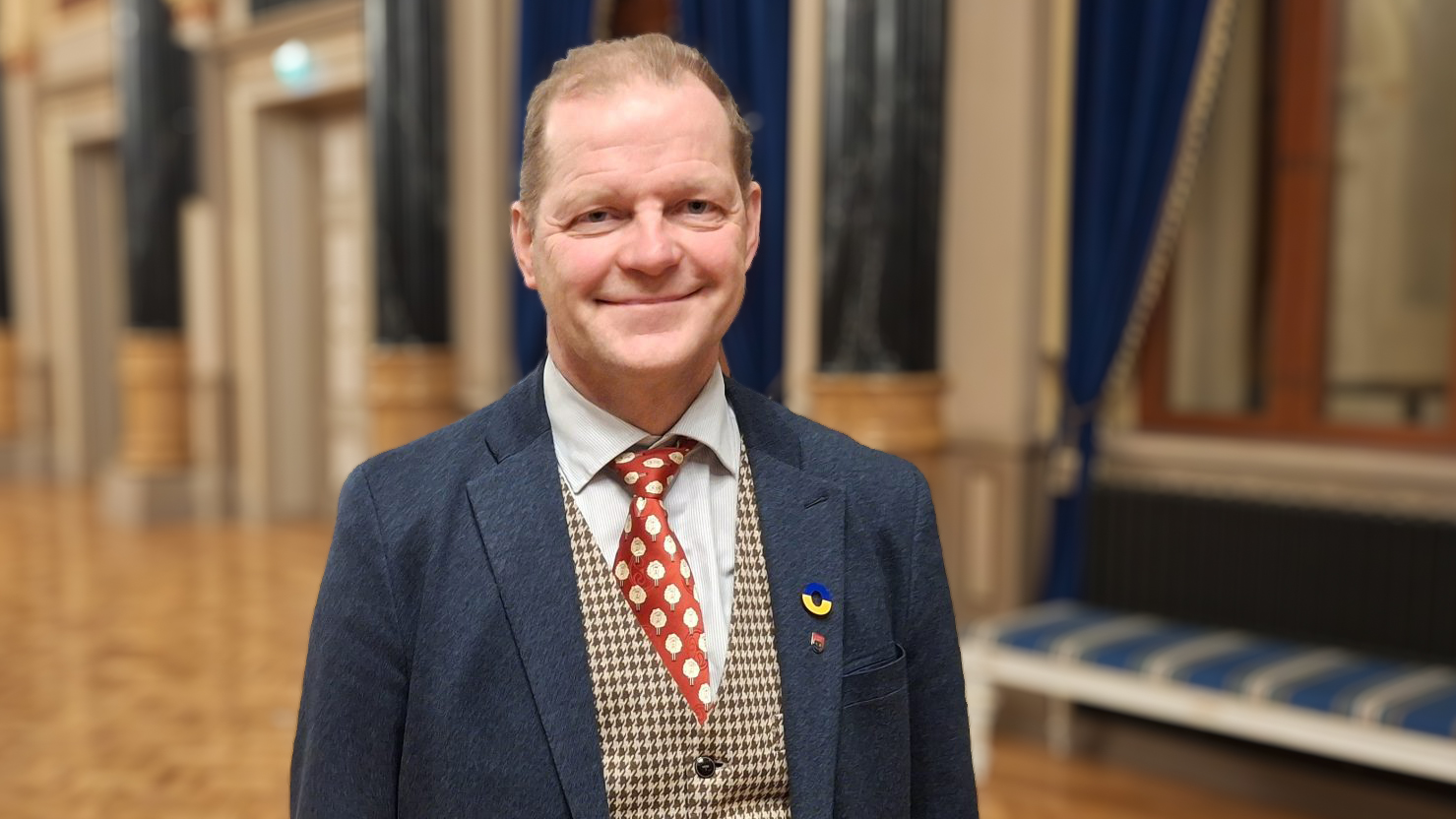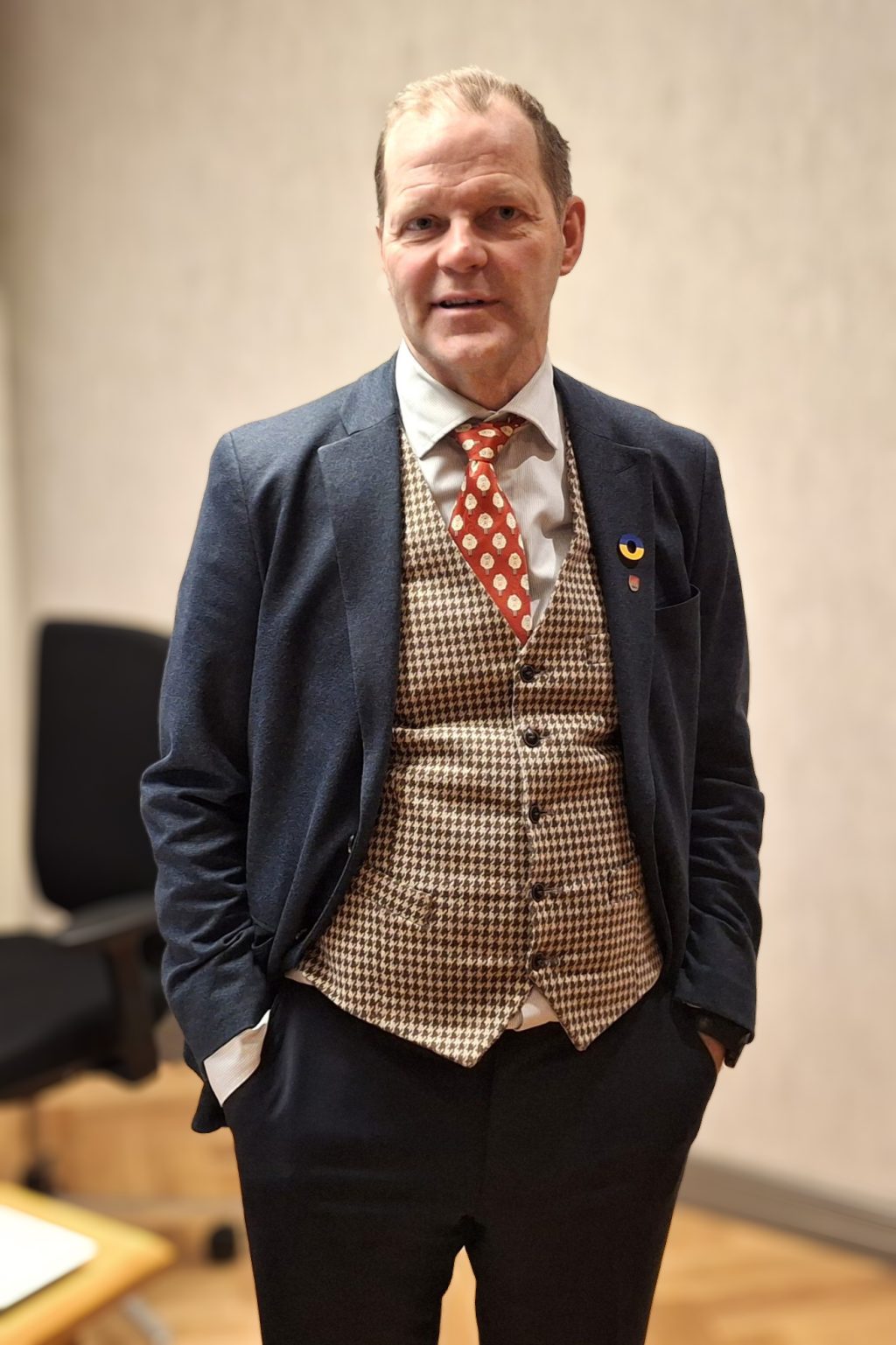My Oulu: Mayor Ari Alatossava: Oulu is the train engine of the north, but the railway must be built together

Mayor Ari Alatossava is pleased with the new era in the City Hall. Alatossava, who has practically led the city already for a year, is happy to see good cooperation between city administration and elected officials in everyday work. Photos: Pia Kaitasuo
A humanist as a mayor of a large city is quite rare, as Ari Alatossava knows. A person acquainted with the history of humanist science nevertheless has many trump cards: quick adoption of information and routine for adapting and understanding the reasons behind everything.
A traditional way to break the ice in Oulu is to ask where your discussion partner is from. Oulu is a meeting place: some come to visit, some to stay and put down roots.
Ari Alatossava, who was chosen as Mayor in April but has practically led Oulu since December 2023, gets to answer the same question.
“I am from nowhere”, he states with a laugh and explains that he was born in Nurmes to a father from Tervola and a mother from Liperi, Northern Karjala. He spent his childhood in Koillismaa, Kuusamo, where his father worked as a cheese master for 40 years.
“I love Emmental cheese more than anyone! The stronger the better.”
Alatossava mentions that he worked at the cheese plant himself too but decided to find his career elsewhere. After his military service, he studied at Tornio’s Business and IT Institute. Like many of his contemporaries, he saw great potential in the development of information.
“I thought that computing was the next big thing”, he reminisces.
Oulu attracted many business school graduates and Alatossava took an advertisement job at the local radio station Kaiku. After six months, he worked at Kesko’s credit department where he learned a valuable skill: realism in business.
“We listened to the troubles of entrepreneurs”, he states. “From there, I transferred to work for the city of Oulu for the first time: I worked for a time in the city’s computing centre.”
Passion for learning, however, pulled him into studying. Alatossava explains that he searched for a suitable field with two criteria: interest and entrance exams. An interest in history drove him to pick up Oiva Ketonen’s classic Eurooppalaisen ihmisen maailmankuva (“The worldview of a European human”) and read it so thoroughly that he received a place in the University of Oulu’s history department.
“I just gave a speech at the subject’s 50th anniversary celebration.”
Careers in municipal administration traditionally begin via different routes, often through administrative science studies.
“A humanist as the mayor of a large city is rare”, Alatossava states. He believes that his background in history offers him two trump cards in a mayor’s central role of information processing.
“First, I have to understand and internalize a lot of diverse matters quickly. Secondly, I know that there are causes for everything.”
Alatossava refers to how analyzing events happening today can not only reveal their causes but also give hints to their coming effects.
“This moment we are living in is important, of course, since this is the only life we have, but we project our actions to the future all the time, whether it has to do with our families or work. We consider what is smart and what is not.”
Innovative mayor
If the road to mayor has deviated from the usual, it has been seen as a benefit for Alatossava.
Before he worked in Oulu, he worked as the municipal mayor of Ii for seven years. Before that, he worked for 15 years in Ii and as CEO for Oulu’s Southern innovative technology business groups promoting their business environment.
Experience in the business sector and public administration, highlighting the importance of cooperation, projects and project planning and daring initiatives have all brought practice that seem to benefit Oulu. Citizens of Oulu can assume that innovation has become a part of Alatossava’s ethos and thus benefits citizens.
“Principles are the same whether you lead a larger or smaller municipality”, Alatossava states.
“As a person with business training, I know that more money needs to come in than goes out.”

“I have a morning and evening shift on the same day”, Ari Alatossava cracks. As contrast to long workdays, he spends his free time outside hiking. “I try to relax.”
Oulu is working hard to develop the city’s attraction and retaining power. Alatossava’s own history is a suitable example of how this has succeeded. Oulu has been his home city since 1988. His family has lived here as work has sent Alatossava to the south and north.
Oulu’s attractiveness is undeniable: Alatossava points out that population growth was larger than ever in 2023, as much as 3 000 people.
“A part of them, maybe a third, are students who will stay here for some years and those years are decisive. We hope that they will finish their studies, but we hope for other things as well. Oulu has a chance to show that they can live here for longer.”
There are 35 000 students in Oulu now and the city has not examined its attraction and retaining power in an ivory tower. Instead, the city has invited the students into the planning room.
Alatossava points out that it is essential to find work by the end of studies.
“Businesses and educational institutions should see this and offer internships so that students can get a hold of Oulu’s cooperation. One’s own student community is important but alone is not enough.”
On top of work, atmosphere is significant when it comes to retaining power, he states.
“Does Oulu feel familiar or personal depends on, among other things, friend groups, hobby opportunities, the city’s comfortability and events.”
These so-called soft retaining factors are often considered more and more essential, but Alatossava sees work as equally important. Oulu has managed to get students to stay in the city relatively well.
“It might be due to Oulu’s relative distance, there are not many competing factors. Also, there are jobs here.”
Borders are artificial in economy
Alatossava highlights the importance of the Oulu region: there are 130 000 jobs in the Oulu region.
“Of course, Oulu has 216 000 residents in North Ostrobothnia, which has over 400 000 residents. Oulu is in its own class, and that has large effects.”
The Mayor states that he tries to stay pragmatic: cooperation is done in larger or smaller groups and without tripping on municipal borders.
Alatossava reminds that the Northern Programme, which aims to utilize the potential of the four northern counties in the future and was included in the Government Programme, was initiated by Oulu. The programme still awaits the Government’s final approval.
Oulu is the train engine of the north, but development that takes place elsewhere affects us as well, he states.
“For example, this great and extremely welcome news about Google in Muhos. It is magnificent that the business comes here to the Oulu region – everyone benefits. And if the French Verso Energy’s plans of a hydrogen plant in Oulu Harbor comes true, the entire Oulu region will benefit from it”, Alatossava clarifies.
“The borders determine school districts, but in economy and vitality the borders are more or less artificial.”
“There must be cooperation because nationally we are quite small – it can be measured with population and members of Parliament, for example. If we keep staring at our low population numbers, we will always lag behind. It is not the correct measure. We need to find other matters to lift us to national popularity and visibility.”
The University of Oulu and technological innovations are the leading principles according to Alatossava. “There is a lot of interesting stuff there to stand out and build a future.”
Highlighting communality
The Experience Arena, the Museum and Science Centre Tiima, Nallikari – Oulu is communicating strongly about investing in the future.
“Our spearhead projects communicate two messages: when be build, things happen and that is a positive sign. On the other hand, it is a sign that we get things done.”
Of course, there have been issues with other projects, and Alatossava received criticism on this during a visit.
“One person at a pension organization event stated that I am the fifth mayor who says that the Station Centre project will launch.”
Alatossava awaits the coming European Capital of Culture year with excitement. He states that the year will bring a real “firework of events”. However, it is important that everyone gets to participate together.
“I hope so. The importance of communality cannot be overstated.”